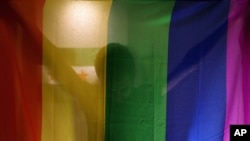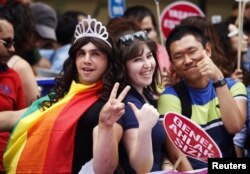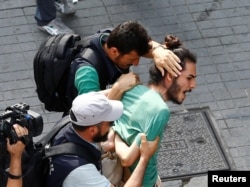Muhammed Wisam Sankari, a Syrian gay refugee, was found raped and beheaded in Istanbul last month. In Mersin, some people attacked a transgender woman known as "Melisa," chanting "God is great" and beat her up. No one was arrested. Hande Kader, a transgender woman and LGBT rights activist, was kidnapped, raped and burned to death in Istanbul in August.
These attacks and similar incidents in recent years have led to calls for the Turkish government to do more to protect members of the LGBT community.
Ty Cobb, Human Rights Campaign's global director, told VOA that a strongly worded letter by 57 members of the U.S. Congress was sent to the Turkish government after Kader's murder and the other attacks.
"We worked with [the U.S.] Congress,” Cobb said. “There was no response from the Turkish government. The Turkish government has a duty to protect all of its citizens regardless of sexual orientation and gender identity."
Cobb said that the overall instability in Turkey and the region have contributed to attacks on the LGBT community.
Activists push for legislation
Homosexuality is not illegal or criminalized in Turkey, but Cobb said nondiscrimination protection and hate crime legislation are needed there.
"The government should consult with LGBT organization; it should invest in police training with the specific knowledge to address the challenges faced by this community, particularly transgender sex worker community," he said.
After Kader was burned to death in Istanbul, Sean Patrick Maloney, a U.S. congressman who is LGBT Equality Caucus co-chair, said the Turkish government should take strong action to ensure that LGBT Turks are protected, safe and able to live their lives openly and freely.
Sezgin Tanrikulu, a Turkish human rights lawyer and a member of parliament from the main opposition party CHP, told VOA that Turkey's official policy for the LGBT community has always been discriminatory.
Islamic State propaganda, he added, is making the anti-LGBT elements more brazen.
"When IS videos show barbaric acts against LGBT individuals, then there is certainly an effect on some people in Turkey," he said.
Attempts by VOA to contact the Turkish family ministry went unanswered. The ministry's website defines its mission as "to increase the welfare of the individuals, families and the society with priority given to disadvantaged sections."
‘Equal before the law’
One Turkish official who did not want to be named told VOA that Turkey was a democratic country ruled by laws.
"I don't know about the specific murder cases, but all citizens of Turkey are equal before the law. I am sure all will be done to solve those murder cases and bring perpetrators to justice," the official said.
The U.S. State Department's latest human rights report said, "Senior Turkish government officials used anti-LGBT, anti-Armenian, anti-Alevite and anti-Semitic rhetoric, particularly during polarizing election campaign periods."
According to the State Department report, the Turkish government took limited steps to investigate, prosecute and punish members of the security forces and other officials accused of human rights abuses. "Impunity was a problem," the report said.
In June, Istanbul police banned LGBT parades after Islamist and nationalist groups threatened that they would not allow "degenerates" to hold events on Turkish soil. Turkish police fired tear gas to disperse a gay rally in defiance of the ban.
In International Lesbian, Gay, Bisexual, Trans and Intersex Association report on LGBT rights in 49 European countries says Turkey was number 46 on the list. Rankings are based on how the laws and policies of each country impact the lives of LGBT people.











